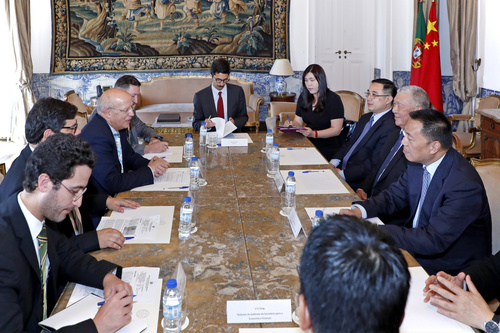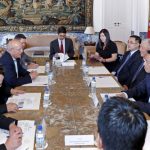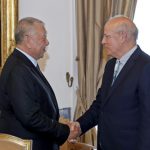 The Vice Chairman of the National Committee of the CPPCC and former Chief Executive of the Macao SAR, Mr Edmund Ho Hau Wah, and the Secretary for Economy and Finance, Mr Leong Vai Tac, meet with the Minister of Foreign Affairs of the Portuguese Republic, Mr Augusto Santos Silva, in Lisbon, Portugal.
The Vice Chairman of the National Committee of the CPPCC and former Chief Executive of the Macao SAR, Mr Edmund Ho Hau Wah, and the Secretary for Economy and Finance, Mr Leong Vai Tac, meet with the Minister of Foreign Affairs of the Portuguese Republic, Mr Augusto Santos Silva, in Lisbon, Portugal.
The Vice Chairman of the National Committee of the Chinese People’s Political Consultative Conference (CPPCC) and former Chief Executive of the Macao Special Administrative Region (SAR), Mr Edmund Ho Hau Wah, and the Secretary for Economy and Finance, Mr Leong Vai Tac, met with the Minister of Foreign Affairs of the Portuguese Republic, Mr Augusto Santos Silva, in Lisbon on 19 June, while visiting Portugal for an event to mark the 15th anniversary of the establishment of the Forum for Economic and Trade Cooperation between China and Portuguese-speaking Countries, a body also known as Forum Macao. Both parties exchanged views on enhancing economic and trade, tourism, culture, and education cooperation between Macao and Portugal.
Mr Ho stated during the meeting that the success in implementation of “One country, two systems” in Macao demonstrated the powerful vitality of this principle, and the sincere commitment shown by China and Portugal, to the Sino-Portuguese Joint Declaration. He said that Portuguese culture and Portuguese residents played important roles in Macao. He agreed with the Portuguese Foreign Minister’s view on the strategic development potential of the “Belt and Road” initiative, and recognised Portugal’s support and involvement in promoting Portuguese language education in Macao.
Mr Ho mentioned two important initiatives relating to Macao and neighbouring places.
First, he noted that the master development plan of the Guangdong-Hong Kong-Macao Greater Bay Area (“Greater Bay Area”) was about to be launched. As one of the Greater Bay Area cities, Macao would build on its advantages in order to assist enterprises from Portuguese-speaking countries to operate businesses in the Greater Bay Area. The overall economy of the Greater Bay Area was dynamic and had broad potential, and the master development plan included a series of pioneering and incentivising policies that would help with introducing products from Portuguese-speaking countries into the Greater Bay Area market.
Second, the Macao SAR Government – and its officials including the Secretary for Economy and Finance – is fully committed to establishing Macao as a platform for cooperation between China and Portuguese-speaking countries in terms of financial services, and as a clearance platform for renminbi – China’s currency – for these countries.
Leaders of some major financial institutions in mainland China also took part in the visit to Lisbon, with the aim of facilitating in-depth and systematic cooperation and of promoting development of Macao’s specialised financial businesses.
The Portuguese Foreign Minister welcomed the visiting delegation led by Mr Ho. He said that Portugal and China have long maintained a good relationship, with frequent high-level exchanges. He described China as an economic, trade and investment partner of Portugal, and was glad to witness Chinese enterprises’ successes in investment in Portugal. China was also an export destination for Portuguese products, he noted. Mr Santos Silva stated Portugal looked forward to exporting more Portuguese products, such as meat products, into the Chinese market, and noted that the Portuguese Government was currently considering how to participate in the Chinese Central Government’s “Belt and Road” initiative.
Mr Santos Silva noted Macao had been enriched by Portuguese culture. For Portugal, Macao was certainly a place of interest in terms of culture and economy. He praised the Macao SAR Government for its great contribution to, and success in, Portuguese language education, and hoped to enhance cooperation between Portugal and Macao in such matters.
He stated that the Forum for Economic and Trade Cooperation between China and Portuguese-speaking Countries was an important platform, in which all Portuguese-speaking countries were participating in order to achieve deeper cooperation. He hoped Forum Macao would facilitate greater investment and cooperation in the future.
The Portuguese Republic’s Secretary of State of Internationalisation, Mr Eurico Brilhante Dias, also attended the meeting with the Macao delegation. He said the Portuguese Government attached great importance to convention and exhibition activities in Macao, and would this year again assign officials and organise participation by Portuguese enterprises and exhibitors, in the annual Macao International Trade and Investment Fair. He also hoped that the China-Portuguese-speaking Countries Cooperation and Development Fund, established by Forum Macao, would provide further support to small and medium-sized enterprises from China and Portuguese-speaking countries.
During the meeting, Mr Leong agreed with Mr Santos Silva that Forum Macao had become an important element in the city’s economic progress, and said the Macao SAR Government would strive to help the city serve as a platform for cooperation in financial services between China and Portuguese-speaking countries. A total of 25 cooperation agreements were due to be signed during this visit, including for a new agreement between Macao and Portugal on avoidance of double taxation, that would be advantageous for the establishment of a financial services cooperation platform.
China’s Ambassador to Portugal, Mr Cai Run, also attended the meeting, and hosted a banquet for the Macao delegation in the evening.
View gallery


